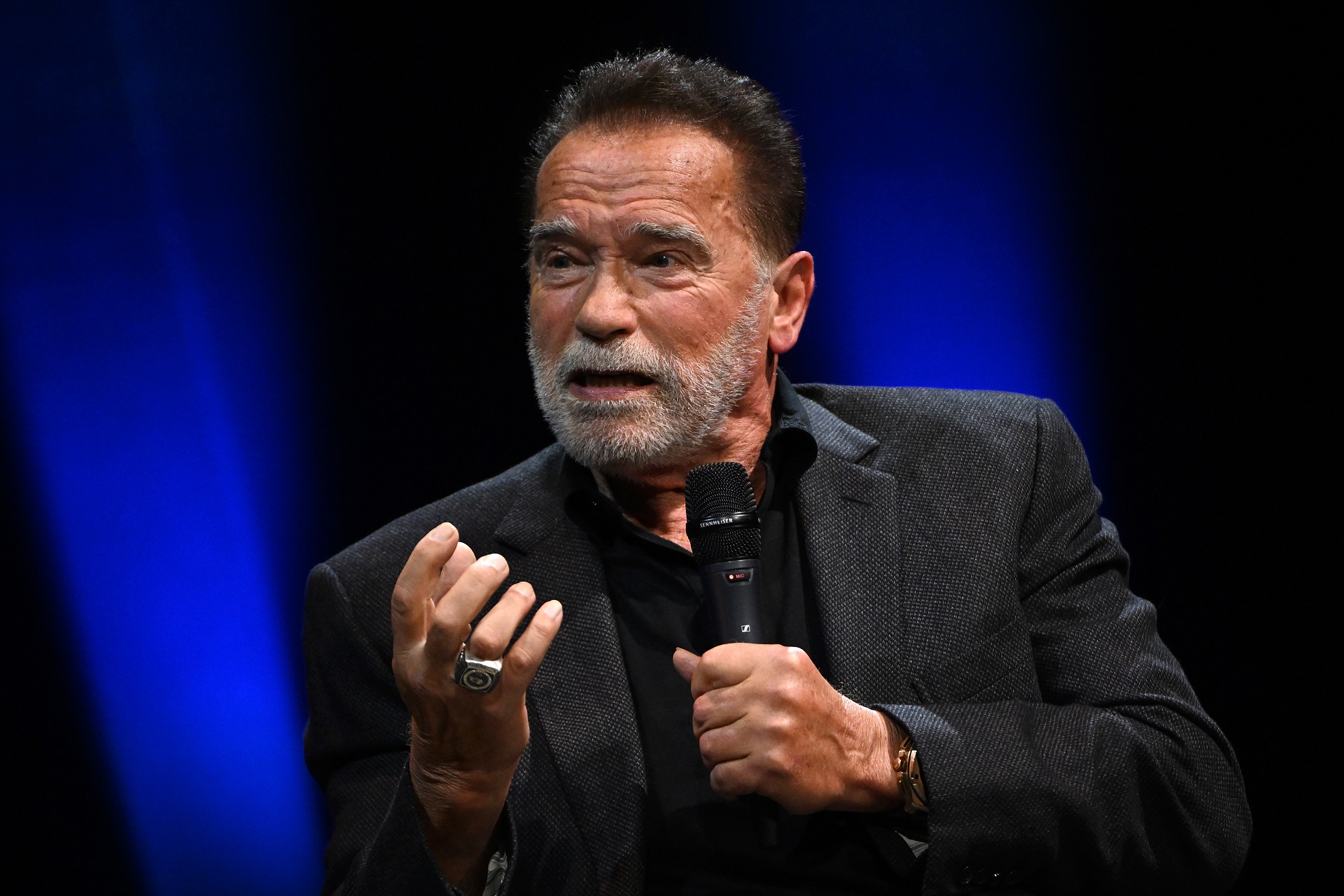
Arnold Schwarzenegger wants you to know that you’re a lazy piece of s***. But he’s going to tell you politely; with care and a few encouraging suggestions. He’s going to be good-natured and nonjudgmental about it. Or a bit judgmental about it. But only because he doesn’t want you to be a lazy piece of s*** any more. Instead, he wants you to be useful.
If that titular phrase sounds like something a parent tells their kid when said kid is hovering about after school, that’s because it’s exactly what Schwarzenegger’s disciplinarian policeman father used to tell him (and, indeed, Arnie went on to sponsor a nationwide after-school programme).
Schwarzenegger, 76, is now in the "fourth act" of his life. He’s been the world’s most famous bodybuilder, a Hollywood movie star, a surprise (mostly hit) governor of California and now an author and quasi-motivational speaker — the catalyst for which was the viral videos he posted during the US pandemic lockdown.
I remember, in April 2020, watching Schwarzenegger on Twitter with his pet donkey Lulu and miniature horse Whiskey. The animals were "demonstrating" social distancing guidance, while their owner radiated warmth in a terrifying time. Then came a different register: his stirring, home-filmed speech after January 6 in which he compared the storming of the Capitol to Kristallnacht and pleaded for the protection of US democracy. Maybe we had underestimated him. Zeitgeist-capturing animal lover; rhetorician for the ages. Who knew?
Arnie knew. Because people — "naysayers" — have underestimated him his whole life and he doesn’t want you to doubt yourself for a second. Be Useful is a hybrid work. Part Jordan Peterson’s bro life-hack manual slash pop philosophy (the book’s subtitle, Seven Tools for Life, is very similar to Peterson’s 12 Rules for Life); part Instagram motivational quotes slash Arianna Huffington’s obsession with "thriving", it is threaded through with relevant memoir.
Self-help can be a dubious scene to be a part of. Not financially — the industry is booming to the point where life coaches will charge money for others to take their life-coaching courses in what is, as far as I can tell, a Ponzi scheme for dream-journaling. But there’s the toxic masculinity of an Andrew Tate(and, to a lesser extent, Peterson) or the woo-woo of the wellness crew. Much of it is uncomfortably gendered, with polar extremities of dangerous and twee.
But Schwarzenegger, far from the cyborg killing machine of his catchphrase film role, is an amiable instructor. A lot of the basic stuff here works. His idea to beget ideas is walking, which, as he points out, is not an original one; he’s just seconding Nietzsche and Aristotle. He recommends incremental changes at first, which is what most primary care doctors might suggest. Lots of advice is similar to that found in 1980s and ’90s classics of the genre that either attempted to compensate for the booming rat-race class or else leaned into it. He talks about surrounding yourself with supportive people. All this is good, sound practice. There are the usual Nelson Mandela and Dalai Lama citations. There is, mercilessly, nothing wacky.
And there’s plenty of humour to offset the more Sandhursty bits. When he talks about "putting the work in" during drama training, he jokes that he wants his money back for the accent-removal classes. He chops off the bottom half of every pair of his joggers so he can work on his calves more easily. He’s also extremely smart (it still bums him out that bodybuilders are dismissed as airheads) and obsessed with knowledge. One section is called "Be a Sponge". Schwarzenegger can’t get enough of experts. Whether it’s being taught how to bricklay to make ends meet, or being schooled on the history of gerrymandering as a rookie politician, Schwarzenegger wants your help. And, in turn, he’ll pay it forward. Sometimes literally, as when donating $US1 million to Covid relief efforts or in time and mentorship, when teaching kids with learning disabilities to bench-press. He hates the phrase "self-made" because, while he recognises it’s meant as a compliment, he believes the opposite — namely, it takes a village (specifically, in his case, Thal in Austria, and then a man called Fredi Gerstl).
There’s always a concern with books such as these: will they acknowledge the discriminatory nature of social hierarchical structures and institutions, economic circumstances, health issues and various other impediments to fulfilling potential? Schwarzenegger nods towards them, but more so takes the line that if he, a kid who grew up in a house with no running water, can make it, then anyone can. People will have their views on that, although he’s transparent that one person’s version of fulfilment (pushing through groundbreaking environmental legislation) might differ from another’s (wholesome family; a good job that pays the bills). He loves pain, because "pain is the measure of growth potential". I sort of love pain in the service of growth — which is why I’m happy to swim in 4degC open water — but most of us would be a bit pissed off if, say, a lackadaisical surgeon butchered our aorta during what was supposed to be a routine procedure. Arnie just sets about counting how many laps he can do to the bathroom while stuck in hospital.
The triumph of this book is that it’s quite rare in the self-help canon — or what publishers now term personal development — to not make a cynic such as myself roll their eyes, and this one doesn’t. It’s a shame that whoever was responsible for the jacket blurbs takes a shoving-a-finger-in-your chest approach that isn’t replicated by the variable tone inside, which is sometimes dogmatic but often reflects the genuine kindness and enthusiasm of its author. Be Useful, it turns out, is very helpful. — The Observer












